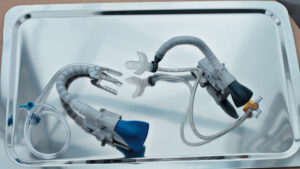
Evaluating the Impact of a Standardized Protocol for Managing Refractory Vasoplegia After Cardiopulmonary Bypass
This single-center pre-post study evaluated a standardized stepwise protocol for refractory vasoplegia after cardiopulmonary bypass (CPB). Compared to provider-directed therapy, the protocol—escalating from methylene blue to angiotensin II and hydroxocobalamin—accelerated norepinephrine-equivalent reduction and reduced vasopressor costs by 26% at 48 hours, without worsening hemodynamic or clinical outcomes.










